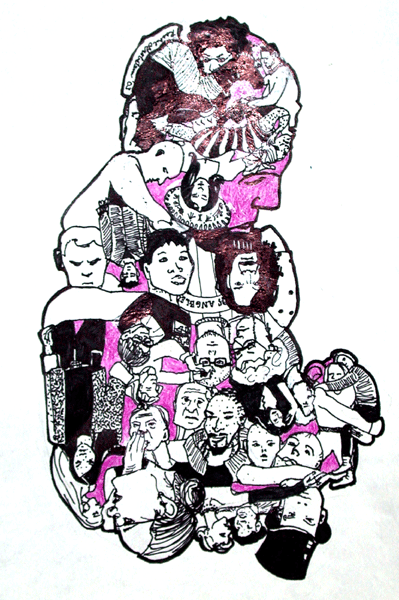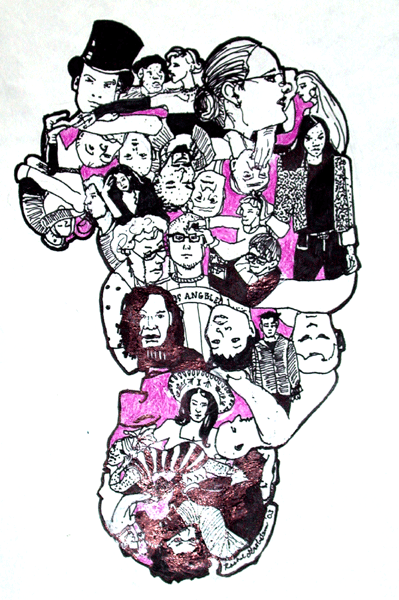Made available on Serendip
In association with Making Sense of Diversity: An Exploration, a world wide conversation

|
February 3 , 2006
Katie Campbell, Ellie Esmond and Debbie Rubin
Challenging Ourselves:
Poverty--Stereotypes and Service
Participants
Summary
Prepared by Vanessa Christman
Additions, revisions, extensions are encouraged
in the On-Line Forum
| 
|
What comes to mind? To start the hour, facilitators Debbie Rubin (Director of Service and Activism, Civic Engagement Office), Ellie Esmond (Training and Programming Coordinator, Civic Engagement Office) and Katie Campbell (Class of 2006) asked the participants to take part in an exercise. They asked people to write on a slip of paper (to be put in a bag until later in the hour) their responses to the following question:
When you think of a poor person, what comes to mind?
All three presenters mentioned that they have strong feelings about today's topic—especially the service aspect of it. Katie mentioned that she had been interested in having a discussion since the fall of 2004, and she was glad the topic had been included in this year's Diversity Conversations series. She gave some background on her own recent experiences with service and activism at a youth retreat in Chicago.
______ is the word that I use to describe. The facilitators next encouraged people to examine the words service, charity and activism. People shared the following thoughts, among others:
- Service is neutral—less laden. Charity is someone from one class trying to help another. Activism is working to change the system.
- Service can be through a church group, organization—something you feel passionate about. Charity is giving to those less fortunate.
- Activism changes things at a deeper level.
- Is there a hierarchy? Maybe more of a continuum: charity—service—activism Are they valued differently?
- Charity is given—service is to help out—usually includes a money component. Activism is advocacy—to do on behalf of others who can't— to speak for those who can't, for example.
- Community service implies interaction with the people one is helping—charity does not connote this interaction. Activism is more behind the scenes.
- Service = helping by acting, but not changing the overall system, Charity = giving money, especially to those who are poor, Activism = making a change
- Service = grassroots change, Activism = policy change, Charity = service + activism + anything else one can give
Straight from the heart. The facilitators then encouraged people to speak from experience. What kinds of community service had they been involved with?
A soup kitchen, showing love in the Oakland community.
An Indian reservation through a church group. The family was so grateful. The experience taught appreciation for what she had.
Service in the weeks following 9/11 in New York. At first, people were very generous—writing checks immediately. After a week or so, people were more questioning. The experience still felt good to her, but it was disheartening how quickly people turned back to cynicism.
Helping after Katrina with refugees in Houston. The recipients were, a participant's stepdaughter told him, ungrateful because they did not have any choice about how they were helped. What does one say in that case?
Should everyone do service? Sometimes people don't want to but feel they should.
And what about when the response is not what the people need? In the wake of Katrina, and after the tsunami before that—so often the response was a clothing drive. It is easy for Americans to do, but how helpful is it?
People respond with “Here's what I can do,” vs. “What do these people need?”
Someone spoke of her experience with an interfaith hospitality network and her realization that recipients in that situation don't want sympathy or empathy, or even to talk about their lives/situations.
Service and charity may be synonymous in an ideal community—but service is now needed because it's not provided otherwise. Recipients may feel “I shouldn't be in this situation in the first place.” We should try for understanding, since the service is tied into a social context.
What motivates us to do service?
Love
—but we still want something back.
We want to be virtuous, want to feel good.
Service is voluntary at BMC, but more and more students come here having had a mandatory service experience. People sometimes expect it will be mandated here, too.
So often when we talk about service, we forget that there's a political aspect (e.g. levees in New Orleans, lack of warning alarms in the tsunami region).
Why are those needs there in the first place? And can we address them rationally? One person was inspired by a book on the pedagogy of service learning, but in the field she found the kids got so friendly, so involved with the individuals, they couldn't think about the work structurally.
One-day efforts are not effective. A Martin Luther King Day of Service is all the wrong idea (as was pointed out in a recent panel discussion at Bryn Mawr). It's necessary to keep the dialogue and work going all the time—don't do something then step back into la-la land.
In response to this remark, Katie spoke about Youth Corps in Chicago. In that program you have to form a relationship with individuals. A human connection has to happen to move forward.
Our assumptions are deeply rooted in stereotypes—“I'm gonna go in here and do this, and they're gonna be grateful, and we'll share this experience.” The roles of server and recipient are in our heads in advance.
Revealing. At this point in the discussion, Katie, Ellie and Debbie read the slips. In a preamble/apology, Katie confided that even after three summers working with them, it makes her uncomfortable to be around homeless people. She still stereotypes them as men and alcoholics.
What ideas/stereotypes do we have of poverty? A selection of a few of these thoughts follows:
"I grew up in the suburbs so I didn't know anyone living in poverty"
"systematic" and "endemic"
"I always feel awkward when people ask me for money. Sometimes I give it to them, sometimes I don't. It depends on the situation. I think that it's a huge problem that needs to be put higher on the list of priorities."
"Poor People: poor health, poor education, rough life, neglected"
"Widespread"
"Not enough services, not well understood by mainstream population"
"Homelessness/extreme poverty are not part of my daily world"
How can we best be involved ? The participants shared their reactions to the statements.
Someone said that she volunteers at a center for homeless men. On the day before Christmas, people flood the place with themselves, their children (to see/act) and donations. They are well-intentioned visitors, but the people at the center feel gawked at. The donors/volunteers feel the recipients are ungrateful, but if they are trying to get into these people's lives in 5 minutes—who would appreciate that?!
It's important to meet both volunteers and recipients where they are. Volunteers come around, wanting to help on Thanksgiving, for example. As much as that's not what is sought in the bigger picture, it's a start.
What if guilty is where they are? How many people do service because they feel guilty?
“At least they have a feeling toward it!,” someone replied.
What if you have to do service and cannot receive credit or thanks? How does that feel?
We should at least educate volunteers about this possibility before they go in, someone replied.
We expect a payback. Praxis—placements in literacy, for example. Like much service/activism work, it can seem overwhelming. Volunteers can't control the outcome.
An interesting event happens on occasion on Boathouse Row in Philadelphia—kids from the surrounding neighborhood are invited to the boathouse and boats are open to them. Maybe the answer is to make this not an event . (But that would remove the control and the privilege!)
Regarding homelessness, someone read that if someone's not homeless because of mental illness, they will become mentally ill because of homelessness. One thing each of us can do is make eye contact—help the person not to feel invisible.
Wrapping up, Katie shared some statistics:
- the demand for shelter increased 14% in 2004
- 40% of people experiencing homelessness (note language) are families with children (67% single parent families);
- only 23% are mentally disabled
- 50% are African American.
- while most are eligible for federal benefits (welfare and food stamps) only a fraction receive them and "some 12% of children are denied access to school, despite federal law.
- on any given night in 2000, 1.35 million children experienced homelessness
- the two largest groups are young single adult males and young single adult women (20s or 30s) with small children.
More statistics and information can be found on the following web sites:
http://www.misd.net/Homeless /statistics.htm
http://nlchp.org/FA_HAPIA/
http://blueprinttoendhomelessne ss.org/
Final thoughts.
You might be surprised to learn what needs are in your own community.
Individuals need to know how to get system to work.
Debbie closed by mentioning Owls on the Prowl: BMC has a commitment to service, but she has seen a decrease in attendance over last few years. The CEO struggles with this, knowing that service is important, yet wanting it to be real and meaningful.
| Return to Schedule for Friday Noon Conversations

| Bryn Mawr Conversations
| Archived
Forum
| Archive of Bryn Mawr Conversation
| General Conversation
| Serendip Home |
These pages are sponsored by the Bryn Mawr College Office
of Intercultural Affairs, the Center for Science and Society and the Serendip
website. Send us additional comments or suggestions at Serendip
© by Serendip 1994-
- Last Modified:
Wednesday, 21-June-2005 15:18:00 EST

